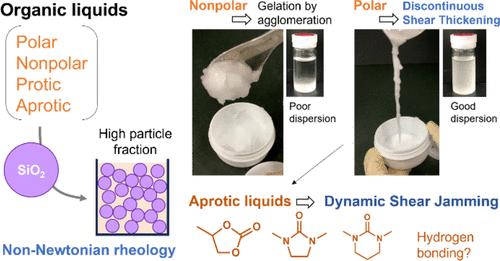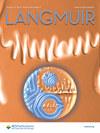液体特性对浓缩二氧化硅悬浮液非牛顿流变学的影响:非连续剪切增稠、剪切堵塞和冲击吸收能力
IF 3.7
2区 化学
Q2 CHEMISTRY, MULTIDISCIPLINARY
引用次数: 0
摘要
浓缩颗粒悬浮液会表现出不连续剪切增稠(DST)和动态剪切堵塞(SJ)等流变行为,影响软装甲等应用。虽然这种行为起源于剪切激活的颗粒与颗粒之间的相互作用,但化学因素,特别是液体的作用对这种行为的影响仍有待探索。悬浮液中的氢键被认为是颗粒间摩擦接触的必要条件,因此,大多数有关 DST 和 SJ 的研究都集中在具有明确氢键能力的水性和原生有机介质上。为了确定另一种分子机制,本研究探讨了液体极性和钝化性质对二氧化硅微颗粒浓缩悬浮液流变行为的影响。由于颗粒分散性极佳,极性液体的 DST 行为与质性和钝化液体无关。相反,非极性液体由于颗粒间的吸引力而形成颗粒团聚,并在颗粒分数较高时变成糊状。三种非质子有机液体(碳酸丙烯酯、1,3-二甲基-2-咪唑烷酮和 1,3-二甲基丙烯脲)的 SJ 行为得到了证实,表明这些非质子液体具有氢键能力。颗粒间剪切激活的相互作用机制多种多样,为浓缩颗粒悬浮液的非牛顿流变学提供了材料设计的可能性。本文章由计算机程序翻译,如有差异,请以英文原文为准。

Effect of Liquid Properties on the Non-Newtonian Rheology of Concentrated Silica Suspensions: Discontinuous Shear Thickening, Shear Jamming, and Shock Absorbance
Concentrated particle suspensions exhibit rheological behavior, such as discontinuous shear thickening (DST) and dynamic shear jamming (SJ), which affect applications such as soft armors. Although the origin of this behavior in shear-activated particle–particle interactions has been identified, the effect of chemical factors, especially the role of liquids, on this behavior remains unexplored. Hydrogen bonding in suspensions has been proposed to be essential for frictional contacts between particles, and therefore, most studies on DST and SJ have focused on aqueous and protic organic media with a definite hydrogen bonding ability. To identify an alternative molecular mechanism, this study explored the effects of liquid polarity and an aprotic nature on the rheological behavior of concentrated suspensions of silica microparticles. Owing to their excellent particle dispersion, the DST behavior of polar liquids was observed, independent of protic and aprotic liquids. In contrast, nonpolar liquids formed particle agglomerates because of the particle–particle attraction and became a paste at a high particle fraction. The SJ behavior was confirmed for three aprotic organic liquids (propylene carbonate, 1,3-dimethyl-2-imidazolidinone, and 1,3-dimethylpropyleneurea), suggesting the hydrogen bonding ability of these aprotic liquids. The diverse mechanisms of shear-activated interactions between particles present material design possibilities for the non-Newtonian rheology of concentrated particle suspensions.
求助全文
通过发布文献求助,成功后即可免费获取论文全文。
去求助
来源期刊

Langmuir
化学-材料科学:综合
CiteScore
6.50
自引率
10.30%
发文量
1464
审稿时长
2.1 months
期刊介绍:
Langmuir is an interdisciplinary journal publishing articles in the following subject categories:
Colloids: surfactants and self-assembly, dispersions, emulsions, foams
Interfaces: adsorption, reactions, films, forces
Biological Interfaces: biocolloids, biomolecular and biomimetic materials
Materials: nano- and mesostructured materials, polymers, gels, liquid crystals
Electrochemistry: interfacial charge transfer, charge transport, electrocatalysis, electrokinetic phenomena, bioelectrochemistry
Devices and Applications: sensors, fluidics, patterning, catalysis, photonic crystals
However, when high-impact, original work is submitted that does not fit within the above categories, decisions to accept or decline such papers will be based on one criteria: What Would Irving Do?
Langmuir ranks #2 in citations out of 136 journals in the category of Physical Chemistry with 113,157 total citations. The journal received an Impact Factor of 4.384*.
This journal is also indexed in the categories of Materials Science (ranked #1) and Multidisciplinary Chemistry (ranked #5).
 求助内容:
求助内容: 应助结果提醒方式:
应助结果提醒方式:


